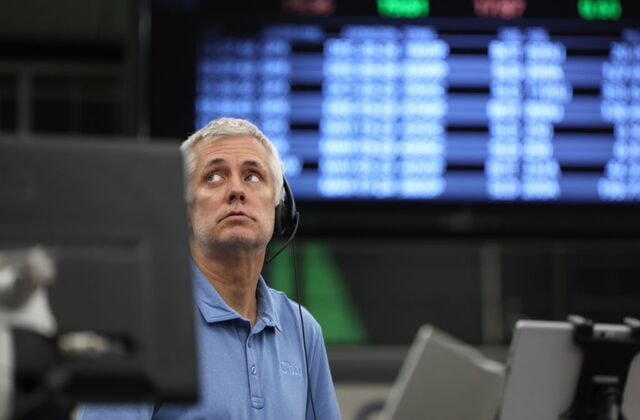Japan's Nikkei 225 Soars: A Deep Dive into Market Dynamics
Meta Description: Japan's Nikkei 225 index surged, fueled by the Bank of Japan's cautious stance on interest rate hikes, Berkshire Hathaway's potential increased investment, and positive employment data. Explore the factors driving this market rebound and the implications for global investors. Keywords: Nikkei 225, Japanese Stock Market, Bank of Japan, Berkshire Hathaway, Japanese Economy, Interest Rates, Market Rebound, Global Investment
Whoa! Hold onto your hats, folks! The Japanese stock market, specifically the Nikkei 225, just experienced a rollercoaster ride – a dramatic plunge followed by a spectacular rebound. This isn't just some fleeting market fluctuation; it's a compelling narrative weaving together global economic anxieties, central bank policies, and the shrewd investment strategies of legendary figures like Warren Buffett. This detailed analysis will unpack the recent volatility, revealing the key players and underlying forces shaping the future of this significant Asian market. We'll delve into the intricacies of monetary policy, dissect the implications of Berkshire Hathaway's actions, and assess the overall health of the Japanese economy. Get ready for a fascinating journey into the heart of the Nikkei's recent ups and downs, examining the data, the speculation, and the human drama driving this exciting market story. Prepare to unravel the mysteries behind this impressive turnaround and gain valuable insights that could significantly impact your investment decisions! We’ll look at everything from the subtle shifts in central bank rhetoric to the bolder moves of global investment giants – we’ll leave no stone unturned in our quest to understand the latest developments in the Japanese stock market!
Nikkei 225: A Market in Motion
The Nikkei 225 index, a barometer of the Japanese economy, has been making headlines recently. After a significant dip, fueled by anxieties surrounding potential interest rate hikes and broader global market uncertainty, the index staged a remarkable comeback. This surge wasn't a random event; it was driven by a confluence of factors, each playing a crucial role in the market's dramatic shift. Let’s explore the key elements that significantly influenced this upward trajectory.
The Bank of Japan's Cautious Approach
One of the most significant factors contributing to the Nikkei's rebound was the Bank of Japan's (BOJ) continued cautious approach to interest rate hikes. After a period of speculation about imminent tightening, the BOJ's latest meeting minutes reiterated its commitment to maintaining a loose monetary policy. This reassurance calmed jittery investors who had feared aggressive rate increases would stifle economic growth and negatively impact corporate profits.
The BOJ's statement wasn't simply a matter of words; it sent a clear signal to the market. By emphasizing the need for patience and a continued focus on supporting economic stability, the BOJ effectively mitigated the risk of abrupt policy shifts. This cautious stance provided a much-needed dose of confidence, encouraging investors to return to the market.
This isn't just about the BOJ's official statements; it's about the underlying economic context. Japan, like many other developed economies, is grappling with inflation. However, the BOJ's approach has been more measured than some of its global counterparts, reflecting a nuanced understanding of the potential trade-offs between inflation control and economic growth.
Berkshire Hathaway's Potential Investment Boost
Another key catalyst for the Nikkei's resurgence was the market speculation surrounding Berkshire Hathaway's potential increase in investments in Japan. News reports suggested that Berkshire Hathaway is planning another round of yen-denominated bond issuance, fueling speculation that the company is looking to further expand its holdings in Japanese companies. This news sent positive ripples throughout the market, as investors interpreted it as a vote of confidence in the long-term prospects of the Japanese economy.
Warren Buffett's reputation precedes him. His investment decisions carry significant weight, and his perceived interest in the Japanese market has a demonstrably positive effect on investor sentiment. This isn't just about the money; it's about the validation. Buffett's actions suggest that he sees value and potential in the Japanese market, a sentiment that other investors are clearly echoing.
The potential for further investment from Berkshire Hathaway also underlines the attractiveness of Japanese companies to global investors. This influx of foreign capital can provide a significant boost to the stock market, driving up prices and attracting even more investment.
Positive Employment Data: A Sign of Strength
Adding to the positive momentum, Japan reported better-than-expected unemployment figures. The decline in the unemployment rate signaled a robust labor market, further bolstering investor confidence in the economy's underlying strength. This data point reinforced the narrative that the Japanese economy is weathering the global economic headwinds relatively well.
Low unemployment is a powerful indicator of economic health. It suggests that businesses are confident enough in their prospects to hire, indicating a healthy level of economic activity. This positive employment data served as a counterpoint to the global economic anxieties that had been weighing on the market.
Analyzing the Nikkei's Recent Volatility
The Nikkei's recent journey is a case study in market dynamics. The initial plunge was driven by a combination of factors, including concerns about rising interest rates (globally and in Japan), weakening global economic growth forecasts, and the uncertainty surrounding the new Prime Minister's economic policies. However, the subsequent rebound demonstrates the market's inherent resilience and its ability to respond positively to reassuring news. This volatility underscores the importance of careful risk management and a long-term perspective when investing in any market.
The Impact of Political Leadership
The change in political leadership in Japan also played a role. While initial concerns existed about the new Prime Minister's potential economic policies, his subsequent assurances and emphasis on maintaining a supportive monetary policy helped to ease market anxieties. This highlights the important interconnection between political stability and market confidence. Investors favor predictable and stable political environments, viewing them as less risky and more conducive to investment.
Understanding the Global Context
The events surrounding the Nikkei 225 are not isolated incidents but rather part of a broader global economic landscape. The market's reactions reflect not only domestic factors, but also global trends, such as inflation, interest rate adjustments, and geopolitical uncertainty. Understanding this global context is crucial for interpreting the Nikkei's movements.
Frequently Asked Questions (FAQs)
Q1: Is the Nikkei 225's rebound sustainable?
A1: While the recent surge is encouraging, sustainability depends on several factors, including continued positive economic data, the BOJ's monetary policy stance, and global economic conditions. It's too early to definitively say whether this trend will continue.
Q2: What are the main risks facing the Japanese stock market?
A2: Risks include global economic slowdown, inflation pressures, changes in BOJ policy, and geopolitical instability. These factors can all impact investor sentiment and market performance.
Q3: Should I invest in the Nikkei 225 now?
A3: Investment decisions should be based on your individual financial goals, risk tolerance, and investment strategy. Consulting with a financial advisor is recommended before making any investment decisions.
Q4: How does the Nikkei 225 compare to other major global indices?
A4: The Nikkei 225's performance is influenced by global factors but also has its own unique characteristics due to Japan's specific economic and political situation. Comparing it to indices like the S&P 500 or the FTSE 100 requires a nuanced look at each market's underlying dynamics.
Q5: What role does the yen play in the Nikkei's performance?
A5: The yen's strength or weakness against other currencies can significantly impact the Nikkei, as it influences both the attractiveness of Japanese assets to foreign investors and the profitability of Japanese companies involved in international trade.
Q6: What are the long-term prospects for the Japanese economy?
A6: Japan's long-term economic prospects depend on its ability to address challenges such as an aging population, low birth rates, and technological innovation. The government's policies and economic reforms will heavily influence future growth.
Conclusion: Navigating the Future of the Nikkei
The Nikkei 225's recent volatility highlights the complex interplay of global and domestic factors influencing stock market performance. While the rebound is encouraging, it's crucial to maintain a cautious yet optimistic outlook. The BOJ's policies, the actions of global investors like Berkshire Hathaway, and the overall global economic climate will continue to shape the trajectory of the Japanese stock market. Staying informed about these developments is key for anyone interested in the Nikkei 225 or Japanese investments more broadly. The story of the Nikkei 225 is far from over—it's a dynamic narrative unfolding before us, offering both challenges and opportunities for investors willing to navigate its complexities.



